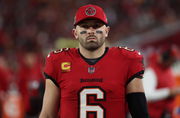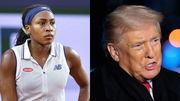
Reuters
Tokyo 2020 Olympics – Athletics – Women’s 400m – Round 1 – Olympic Stadium, Tokyo, Japan – August 3, 2021. Allyson Felix of the United States in action REUTERS/Aleksandra Szmigiel

Reuters
Tokyo 2020 Olympics – Athletics – Women’s 400m – Round 1 – Olympic Stadium, Tokyo, Japan – August 3, 2021. Allyson Felix of the United States in action REUTERS/Aleksandra Szmigiel
There are moments in an athlete’s life that transcend sport and for Allyson Felix, one of the most decorated track and field athletes in Olympic history, that moment came off the track, in a hospital room. What should have been a joyous chapter welcoming her first child quickly turned into a terrifying experience when she was diagnosed with pre-eclampsia just 32 weeks into her pregnancy. According to a John Hopkin Medicine report from 2021, Black women are at a higher risk than White or Hispanic counterparts, “Black women had the highest age-adjusted prevalence of preeclampsia (12.4%) compared with Hispanic (8.2%) and white women (7.1%).” Although, race alone doesn’t account for it all. The condition sent her blood pressure soaring and left both her life and her unborn daughter Camryn hanging in the balance. But outside the solemn hospital room. there was another battle in store for the Olympian.
Watch What’s Trending Now!
As she fought to survive a high-risk delivery, Felix was forced to confront a painful reality. The brand she had represented for over a decade Nike expected her to return to top form immediately. With no guarantees of financial support during her pregnancy. That moment wasn’t just heartbreaking; it was a breaking point. What followed wasn’t just a backlash against a corporate giant, but a bold new beginning. The track sensation would soon channel that pain and pressure. Writing about the experience in her now-famous op-ed and also as the founder of her own sneaker brand, built on everything Nike failed to deliver.
When Allyson Felix sat down to write for The New York Times, she didn’t do it lightly. It wasn’t a PR move. It was a lifeline. The decision weighed heavily on her, not just as an athlete, but as a mother. Trying to make sense of a world that felt deeply unfair. “When I wrote The New York Times op-ed [about my Nike experience], that was an eye-opening experience for me,” Felix shared. “It always felt like you were in this alone because no one was really talking about it.” That isolation was real, and so was the fear. Speaking out against a brand as powerful as Nike wasn’t just a risk. It was a leap into the unknown.
ADVERTISEMENT
Reflecting on the choice to go public, Felix admitted she agonized over it. “I went back and forth for a long time over it because it was so outside of my comfort zone,” she revealed. “I am a people pleaser, so I was really scared.” What finally tipped the scale? Watching her newborn daughter, Camryn, fight for her life in the NICU after a harrowing premature birth. That experience shook her to her core and clarified everything. “The last straw was when Nike reached out and asked me to be a part of this Women’s World Cup campaign and to use my image. At the same time, internally, we are battling over maternal protections. Like, what?” she recalled. In that moment, the hypocrisy was too much to stay silent about. The breaking point came, not just emotionally, but contractually.

ADVERTISEMENT
Felix had inked a deal with Nike in 2017 but hidden in the fine print was a clause. That allowed the company to slash her pay by 70% if she became pregnant. No paid maternity leave, no flexibility. Just a clear message. Motherhood wasn’t part of their business model. That was it. Felix ended the contract and signed with Gap Inc. instead. From that storm came something powerful, Saysh, the footwear brand she founded in 2021. Built for women, by a woman who refused to be sidelined, Saysh became more than a company, it took the form of advocacy and camaraderie.
ADVERTISEMENT
Championing women’s needs: Allyson Felix’s journey to empower female athletes
Allyson Felix, an 11-time Olympic medalist, has always been driven by a mission to make a difference. Especially for women in sports. Her own harrowing experience with pregnancy and the inequitable treatment she received from Nike ignited her passion to create a space where female athletes are seen and valued. That passion led to the founding of her footwear brand, designed with one clear purpose. To prioritize the needs of women in sports. But Felix wasn’t just thinking about fair treatment. She envisioned footwear that truly catered to women’s unique requirements.
“Being a runner, I wanted to bring a performance shoe to the space,” Felix shared in an interview. “It’s different because it is made specifically to fit the form of the female foot. The majority of (shoes) are made off of a last of a man’s foot.” This insight drove Felix to craft shoes that are more than just stylish. They’re made for performance, comfort, and the female athlete’s body. In her eyes, the women’s sports footwear market had long been neglected, and she was determined to bring the change it so desperately needed.
ADVERTISEMENT
But Felix’s impact extends far beyond footwear. As a mother who had to navigate the challenges of pregnancy while being a professional athlete, she is committed to ensuring that other mothers don’t have to go through the same hardships. To that end, she collaborated with Pampers. Creating the first-ever Pampers Nursery at the Paris Olympics’ Athletes Village, offering a much-needed space for mothers to care for their children while still focusing on their training. Felix also joined forces with Melinda Gates in support of reproductive rights and gender equity. Thus paving the way for safer, more equitable spaces for women globally ensuring that women’s voices, needs, and well-being are no longer overlooked.
Top Stories
Baker Mayfield Airs Dirty Laundry With Kevin Stefanski After Former HC Lost Faith in QB

Phil Mickelson Has the Last Laugh After PGA Tour Protege Rejected His LIV Golf Offer

‘Disturbing’ Fake Messages Force Amanda Balionis to Issue Urgent Warning

Scottie Scheffler Takes Side With Blunt 12-Word Message Days After Brooks Koepka’s Return Announcement

“Hard Being a Black Woman”: Coco Gauff on Donald Trump’s Administration

ESPN’s Troy Aikman Bids Goodbye as NFL Broadcasting Season Ends for the Network

ADVERTISEMENT
ADVERTISEMENT
ADVERTISEMENT